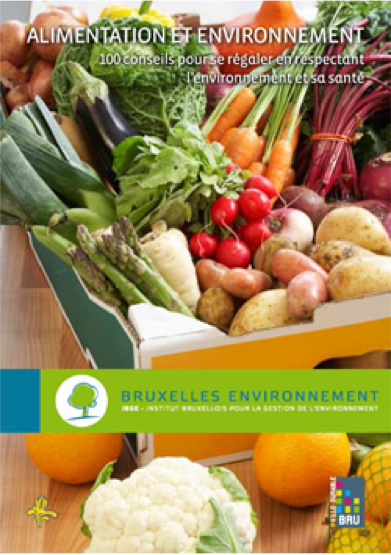Brochure on Food and the Environment for the General Public
May 28, 2013
Contributor: Stephanie Mantell, Brussels Environment
Workshop:
Governance, synergies and local systems / Restaurants
Resource efficiency – CO2 reduction / What key behavioural changes to promote to effectively lessen footprint?

In 2013, A brochure “Food and Environment: 100 tips to enjoy food while respecting the environment and health” was produced by Brussels for the General Public to promote behavioural changes and point towards sources of information.
It is an update of a previous brochure with 65 tips.
Each piece of advice is backed up with facts and figures and tips with additional benefits in terms of Health and/or Savings visually highlighted. For instance for Tip 3 “Limit products of animal origin“ the brochure details :
“The Belgian consumes an average of 120 g of meat per day. But many consumers are well beyond. However, the production of meat and dairy products is about 50% of the impact of diet on the environment and 10% of the overall environmental impact. In addition, recommendations for health limit consumption to a maximum of 75-100 grams per day. Reducing consumption of meat is a benefit for environment & health!”
www.bruxellesenvironnement.be/Templates/news.aspx?id=37545
What is the focus?
Among the pieces of advice 10 are highlighted
1. Rebalance your plate: more fruits and vegetables, less animal products.
2. Produce your own fruit and vegetables.
3. Buy fresh, local AND seasonal.
4. Choose short supply chains.
5. Choose less processed products.
6. Alternate sources of animal and vegetable proteins.
7. Purchase products from organic agriculture or differentiated quality producers.
8. Buy according to need, taking into account the consumption dates.
9. Use your leftovers and store your food properly.
10. Compost organic waste.
The 100 tips
Balance your meals
- Increase consumption of fruits and vegetables
- Choose (food) biodiversity
- Limit products of animal origin
- Alternate sources of animal and plant origin
- Limit sodas
- Drink tap water
- Follow advice on eating and moving by national health body
Produce your own foodstuffs
- grow and rear
- Start with herbs and easy plants
- Think of forgotten vegetables
- Consider small fruit trees (+Money + Health)
- Grow without chemical pesticides and fertilisers
- Call upon family allottment gardens
- Develop or participate a community kitchen garden
- Follow a training in kitchen gardening, ask helpline and kitchen garden masters for help
- Preserve harvest in different ways
- Exchange, give or sell your excess production
- Prepare basic food stuffs yourseld
Shopping
How to shop?
- Make a shopping list
- Read the labels
- Read the by date
- Shop the adequate quantities and mor regularly
- Shop after having eaten
- Take a reusable bag or caddy
- Avoid products with excessive packaging
- Buy in bulk
- Respect the cold chain
What to buy?
- Choose seasonal products
- Consult the claendar of seasonal fruits and vegetables
- Choose tasty local products
- Choose less transformed products
- Give priority to healthy organic products
- Give priority to products of differentiated quality
- Vary the types of meat
- Try out plant protein sources
- Avoid fish from overfished fishstocks
- Give priority to MSC labeled fish
- Avoid palm oil
- Choose products produced in the city
- If you buy exotic products, give priority to fair trade products
- Give priority to drinks in reusable bottles with deposit systems
Where to buy at what cost?
- Choose short supply chains
- Support producers
- Support the local economy
- Sign up for organic baskets
- Shop at the market or even at the farm
- Eat sustainably without it costing too much
Store and preserve
What you have grown yourself or purchased in large quantities
- Vary conservation techniques
- Make preserves
- Make jams and chutneys
What you buy
- Check the shelf life of your wraped products
- Pay attention to the shelf life of your opened products
- Store foodstuffs at the right place
- Apply conservation tips
- Use your fridge effectively
- Clean your fridge regularly
- Use storage containers
- Freeze the surplus
- Keep leftovers as individual portions
- Defrost your freezer regularly
- Consume the products with the closet expiry dates first
Prepare
- Prepare food yourself
- Prepare adequate quantities
- Use measuring devices
- Eat all edible parts of fruits and vegetables
- Eat even damaged fruits and vegetables
- Empty jars and tubes completely
- Use your leftovers
- Save energy when preparing food
Manage waste
- Compost
- Comopost even without garden
- Compost in your neighbourhood
- Get training in composting and call upon compost masters
- Separate waste streams
Eat out
At work or at school
- Bring leftovers to work
- Organise potluck lunches
- Use smart sandwich boxwes
- Call for a sustainable canteen at school or at work
A the restaurant
- Try out organic restaurants
- Try out vegetarian restaurants
- Try out slow food restaurants
- Ask for a portion size adapted to your apetite
- Ask for a “doggy bag”
At events
- Support stands that offer sustainable food choices
Organise “sustainable food” events
- Purchase sustainable food
- Call upon a sustainable caterer
- Prepare the adequate quantities
- Use reusable dishes and cutlery
- Choose reusable cups
- Buy drinks in reusable containers in a deposit system
- Give away your leftovers
Live sustainable Food in the city
- Take part in sustainable cooking classes
- Get receipies
- Sign up for veggie Thursdays
- Be an embassador for change
- Combine world cooking and sustainable food
- Use grandmother’s wisdom
- Let your kids teachers know about educational materials on sustainable food
- Take part in sustainable food leasure activities
- Get more information
Brussels Environment message regarding meat consumption
Among these many pieces of advice which are the most crucial to prioritise in one-message media campaigns?